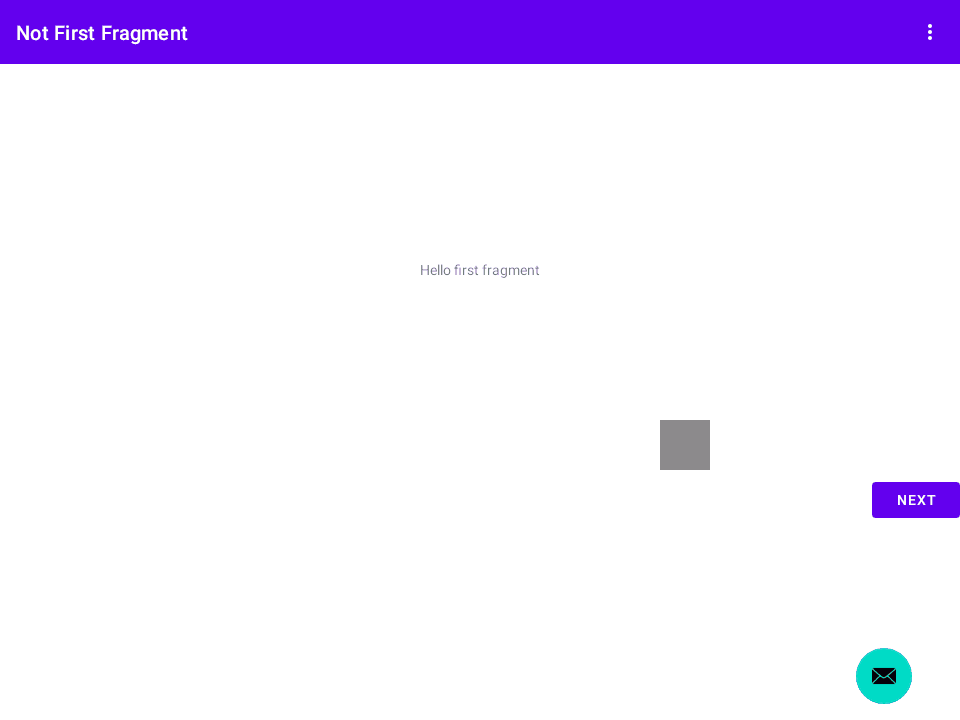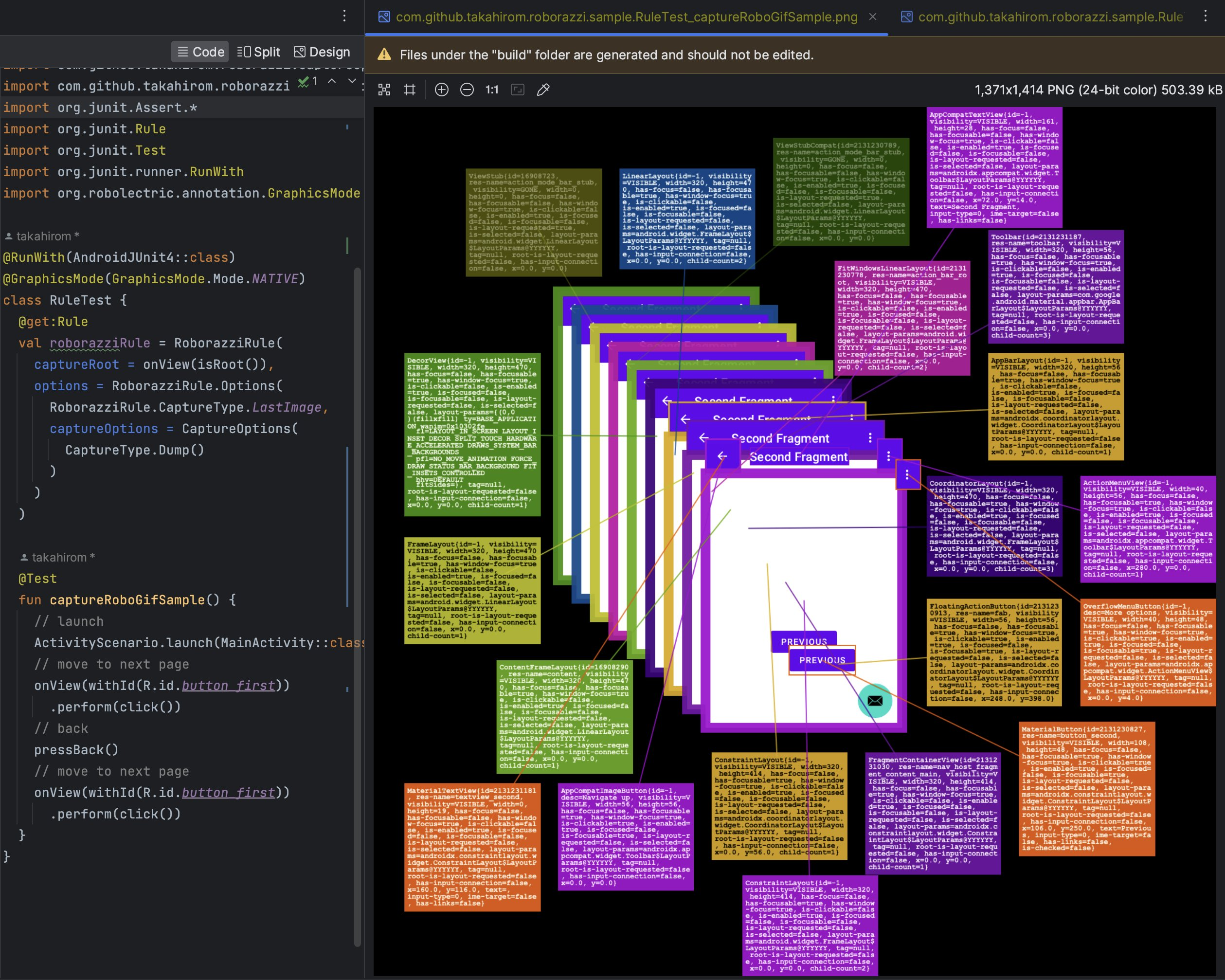Make JVM Android Integration Test Visible
Roborazzi now supports Robolectric Native Graphics (RNG) and enables screenshot testing.📣
To save the image, run recordRoborazziDebug task.
./gradlew recordRoborazziDebug
To view the changes in the image, run compareRoborazziDebug task. This way, the changes between
the image and the one you are saving now will be saved as [original]_compare.png.
And generate a json file that contains the diff information in build/test-results/roborazzi.
./gradlew compareRoborazziDebug
To verify the changes in the image, run verifyRoborazziDebug task. If the image is different from
the one you are saving now, the test will fail.
./gradlew verifyRoborazziDebug
Because when testing on a device, tests can fail easily due to the device environment, animations, etc. This affects the reliability of the test and ultimately, if the test fails, it cannot be fixed.
Paparazzi is a great tool to see the actual display in the JVM.
Paparazzi relies on LayoutLib, Android Studio's layout drawing tool, which is incompatible with
Robolectric.
This is because they both mock the Android framework.
To run tests with Hilt and actually click on components, you need Robolectric.
Available on Maven Central.
This library is dependent on Robolectric. Please see below to add Robolectric.
https://robolectric.org/getting-started/
To take screenshots, please use Robolectric 4.10 alpha 1 or later and please
add @GraphicsMode(GraphicsMode.Mode.NATIVE) to your test class.
@GraphicsMode(GraphicsMode.Mode.NATIVE)Roborazzi is available on maven central.
This plugin simply creates Gradle tasks record, verify, compare and passes the configuration to the test.
Define plugin in root build.gradle
plugins {
...
id "io.github.takahirom.roborazzi" version "[write the latest vesrion]" apply false
}
Apply plugin in module build.gradle
plugins {
...
id 'io.github.takahirom.roborazzi'
}
or
root build.gradle
buildscript {
dependencies {
...
classpath 'io.github.takahirom.roborazzi:roborazzi-gradle-plugin:[write the latest vesrion]'
}
}module build.gradle
apply plugin: 'io.github.takahirom.roborazzi'
// Core functions
testImplementation("io.github.takahirom.roborazzi:roborazzi:[write the latest vesrion]")
// JUnit rules
testImplementation("io.github.takahirom.roborazzi:roborazzi-junit-rule:[write the latest vesrion]")
You can take a screenshot by calling captureRoboImage().
app/src/test/java/../ManualTest.kt
import androidx.compose.ui.test.junit4.createAndroidComposeRule
import androidx.test.core.app.ActivityScenario
import androidx.test.espresso.Espresso.onView
import androidx.test.ext.junit.runners.AndroidJUnit4
import org.junit.Test
import org.junit.runner.RunWith
import org.robolectric.annotation.GraphicsMode
// All you need to do is use the captureRoboImage function in the test!
import com.github.takahirom.roborazzi.captureRoboImage
// Tips: You can use Robolectric while using AndroidJUnit4
@RunWith(AndroidJUnit4::class)
// Enable Robolectric Native Graphics (RNG)
@GraphicsMode(GraphicsMode.Mode.NATIVE)
class ManualTest {
@get:Rule
val composeTestRule = createAndroidComposeRule<MainActivity>()
@Test
fun captureRoboImageSample() {
// Tips: You can use Robolectric with Espresso API
// launch
ActivitySenario.launch(MainActivity::class.java)
// Capture screen
onView(ViewMatchers.isRoot())
// If you don't specify a screenshot file name, Roborazzi will automatically use the method name as the file name for you.
// The format of the file name will be as follows:
// build/outputs/roborazzi/com_..._ManualTest_captureRoboImageSample.png
.captureRoboImage()
// Capture Jetpack Compose Node
composeTestRule.onNodeWithTag("MyComposeButton")
.onParent()
.captureRoboImage("build/compose.png")
// Capture small view on window
onView(withId(R.id.button_first))
.captureRoboImage("build/button.png")
// move to next page
onView(withId(R.id.button_first))
.perform(click())
val view: View = composeTestRule.activity.findViewById<View>(R.id.button_second)
// Capture view on window
view.captureRoboImage("build/manual_view_on_window.png")
val textView = TextView(composeTestRule.activity).apply {
text = "Hello View!"
setTextColor(android.graphics.Color.RED)
}
// Capture view not on window
textView.captureRoboImage("build/manual_view_without_window.png")
// Capture Jetpack Compose lambda
captureRoboImage("build/manual_compose.png") {
Text("Hello Compose!")
}
val bitmap: Bitmap = createBitmap(100, 100, Bitmap.Config.ARGB_8888)
.apply {
applyCanvas {
drawColor(android.graphics.Color.YELLOW)
}
}
// Capture Bitmap
bitmap.captureRoboImage("build/manual_bitmap.png")
}
}It is easy to integrate Roborazzi to your GitHub Actions.
name: store screenshots
on:
push
env:
GRADLE_OPTS: "-Dorg.gradle.jvmargs=-Xmx6g -Dorg.gradle.daemon=false -Dkotlin.incremental=false"
jobs:
test:
runs-on: macos-latest
steps:
- uses: actions/checkout@v3
- uses: actions/[email protected]
with:
distribution: 'zulu'
java-version: 19
- name: Gradle cache
uses: gradle/gradle-build-action@v2
- name: test
run: |
# Create screenshots
./gradlew app:recordRoborazziDebug --stacktrace
# Upload screenshots to GitHub Actions Artifacts
- uses: actions/upload-artifact@v3
with:
name: screenshots
path: app/build/outputs/roborazzi
retention-days: 30name: verify test
on:
push
env:
GRADLE_OPTS: "-Dorg.gradle.jvmargs=-Xmx6g -Dorg.gradle.daemon=false -Dkotlin.incremental=false"
jobs:
test:
runs-on: macos-latest
steps:
- uses: actions/checkout@v3
- uses: actions/[email protected]
with:
distribution: 'zulu'
java-version: 19
- name: Gradle cache
uses: gradle/gradle-build-action@v2
# Download screenshots from main branch
- uses: dawidd6/action-download-artifact@v2
with:
name: screenshots
path: app/build/outputs/roborazzi
workflow: test.yaml
branch: main
- name: verify test
id: verify-test
run: |
# If there is a difference between the screenshots, the test will fail.
./gradlew app:verifyRoborazziDebug --stacktrace
- uses: actions/upload-artifact@v3
if: ${{ always() }}
with:
name: screenshot-diff
path: app/build/outputs/roborazzi
retention-days: 30
- uses: actions/upload-artifact@v3
if: ${{ always() }}
with:
name: screenshot-diff-reports
path: app/build/reports
retention-days: 30
- uses: actions/upload-artifact@v3
if: ${{ always() }}
with:
name: screenshot-diff-test-results
path: app/build/test-results
retention-days: 30
@Test
fun captureRoboGifSample() {
onView(ViewMatchers.isRoot())
.captureRoboGif("build/test.gif") {
// launch
ActivityScenario.launch(MainActivity::class.java)
// move to next page
onView(withId(R.id.button_first))
.perform(click())
// back
pressBack()
// move to next page
onView(withId(R.id.button_first))
.perform(click())
}
}With the JUnit test rule, you do not need to name the gif image, and if you prefer, you can output the gif image only if the test fails.
This test will output this file.
build/outputs/roborazzi/com.github.takahirom.roborazzi.sample.RuleTestWithOnlyFail_captureRoboGifSampleFail.gif
@RunWith(AndroidJUnit4::class)
@GraphicsMode(GraphicsMode.Mode.NATIVE)
class RuleTestWithOnlyFail {
@get:Rule
val roborazziRule = RoborazziRule(
captureRoot = onView(isRoot()),
options = Options(
onlyFail = true
)
)
@Test
fun captureRoboLastImageSampleFail() {
// launch
ActivityScenario.launch(MainActivity::class.java)
// move to next page
onView(withId(R.id.button_first))
.perform(click())
// should fail because the button does not exist
// Due to failure, the gif image will be saved in the outputs folder.
onView(withId(R.id.button_first))
.perform(click())
}
}Test target
@Composable
fun SampleComposableFunction() {
var count by remember { mutableStateOf(0) }
Column(
Modifier
.size(300.dp)
) {
Box(
Modifier
.testTag("MyComposeButton")
.size(50.dp)
.clickable {
count++
}
)
(0..count).forEach {
Box(
Modifier
.size(30.dp)
)
}
}
}Test (Just add RoborazziRule)
@RunWith(AndroidJUnit4::class)
@GraphicsMode(GraphicsMode.Mode.NATIVE)
class ComposeTest {
@get:Rule
val composeTestRule = createAndroidComposeRule<ComponentActivity>()
@get:Rule
val roborazziRule = RoborazziRule(
composeRule = composeTestRule,
captureRoot = composeTestRule.onRoot(),
options = RoborazziRule.Options(
RoborazziRule.CaptureType.Gif
)
)
@Test
fun composable() {
composeTestRule.setContent {
SampleComposableFunction()
}
(0 until 3).forEach { _ ->
composeTestRule
.onNodeWithTag("MyComposeButton")
.performClick()
}
}
}You can use some RoborazziRule options
class RoborazziRule private constructor(
...
) : TestWatcher() {
/**
* If you add this annotation to the test, the test will be ignored by roborazzi
*/
annotation class Ignore
data class Options(
val captureType: CaptureType = CaptureType.Gif,
/**
* capture only when the test fail
*/
val onlyFail: Boolean = false,
/**
* output directory path
*/
val outputDirectoryPath: String = DEFAULT_ROBORAZZI_OUTPUT_DIR_PATH,
val roborazziOptions: RoborazziOptions = RoborazziOptions(),
)
enum class CaptureType {
/**
* Generate last images for each test
*/
LastImage,
/**
* Generate images for each layout change such as TestClass_method_0.png for each test.
*/
AllImage,
/**
* Generate gif images for each test
*/
Gif
}data class RoborazziOptions(
val captureType: CaptureType = if (isNativeGraphicsEnabled()) CaptureType.Screenshot() else CaptureType.Dump(),
val verifyOptions: VerifyOptions = VerifyOptions(),
val recordOptions: RecordOptions = RecordOptions(),
) {
sealed interface CaptureType {
class Screenshot : CaptureType
data class Dump(
val takeScreenShot: Boolean = isNativeGraphicsEnabled(),
val basicSize: Int = 600,
val depthSlideSize: Int = 30,
val query: ((RoboComponent) -> Boolean)? = null,
) : CaptureType
}
data class VerifyOptions(
/**
* This value determines the threshold of pixel change at which the diff image is output or not.
* The value should be between 0 and 1
*/
val resultValidator: (result: ImageComparator.ComparisonResult) -> Boolean
) {
constructor(
changeThreshold: Float = 0.01F,
) : this(ThresholdValidator(changeThreshold))
}
data class RecordOptions(
val resizeScale: Double = 1.0
)
If you are having trouble debugging your test, try Dump mode as follows.
Copyright 2023 takahirom
Copyright 2019 Square, Inc.
Copyright The Android Open Source Project
Licensed under the Apache License, Version 2.0 (the "License");
you may not use this file except in compliance with the License.
You may obtain a copy of the License at
http://www.apache.org/licenses/LICENSE-2.0
Unless required by applicable law or agreed to in writing, software
distributed under the License is distributed on an "AS IS" BASIS,
WITHOUT WARRANTIES OR CONDITIONS OF ANY KIND, either express or implied.
See the License for the specific language governing permissions and
limitations under the License.



